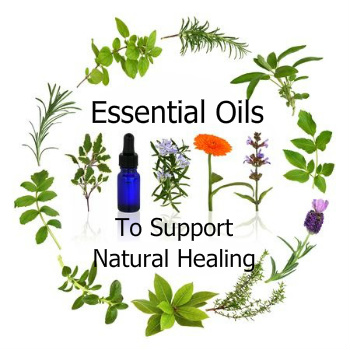- Home
- Essential Oils for Healing
As an Amazon Associate and affiliate with other programs, I may earn revenue from qualifying purchases through affiliate links. This does not affect the price you pay. Privacy Policy / Disclosures. This site is for educational purposes only.
Using Essential Oils for Healing
The following collection of aromatherapy articles looks at using essential oils for healing to deal with minor issues and complement medical care, if appropriate. Seeking the advice of a qualified aromatherapist is a good idea, but if you don't have access to one, you can do some research and choose essential oils to use.
Be sure to follow basic essential oil safety guidelines and stop using anything that causes an adverse reaction. Of course, consult a professional healthcare provider as appropriate or if your condition worsens or doesn't improve.
For Colds, Flu, Allergies, and Immune System
Essential Oils for Allergies
Two of the most commonly recommended essential oils for allergies are German chamomile and lavender.
Essential Oils for Colds
You
can use aromatherapy for colds to support your immune system, to relieve
congestion, and to relieve body aches. Suggested essential oils for
colds include ravensara or ravintsara, eucalyptus, peppermint, and rosemary.
Essential Oils for Congestion
Aromatherapy to help relieve nasal congestion.
Essential Oils for Coughs
Blends to help relieve coughs.
Essential Oils for Flu
Learn
ways to use essential oils to help boost your immune system and, if you
become sick, to help you feel better and speed up your healing.
Essential Oils for Earaches
You can use lavender, Roman chamomile, and tea tree oil for earache and outer ear infections.
Essential Oils for Immune System
Suggestions to support your overall immune system.
Homemade Vapor Rub
Five recipes for a congestion-clearing chest rub.
Essential Oils for Healing Pain and Injury
Essential Oils for Arthritis
Essential oils, such as peppermint and wintergreen, may help relieve arthritis pain and calm inflammation.
Essential Oils for Headaches
Use oils such as lavender, peppermint, and marjoram to help relieve headaches.
Essential Oils for Bug Bites
Relieve the itching and irritation of annoying insect bites.
Essential Oils for Gout
Blends to help relieve the pain of gout.
Essential Oils for Hemorrhoids
Recommended essential oils for hemorrhoids to relieve pain and itchiness include cypress, helichrysum, lavender, and juniper.
Essential Oils for Neuropathy
Essential oils for nerve pain include peppermint, helichrysum, and marjoram. For neuropathy, frankincense and lavender may help.
Essential Oils for Pain Relief
Get information about a variety of essential oils to help relieve pain.
Essential Oils for Migraines
How to relieve migraine pain using essential oils, massage, and self care techniques.
Essential Oils for Muscle Pain
Essential oil blends for relieving muscle cramps and sore muscles and recipes for making rubs similar to Tiger Balm.
For Women
Essential Oils for Hot Flashes
Aromatherapy for reducing the heat.
Essential Oils for Menopause
Manage this time of your life with the help of aromatherapy.
Essential Oils for Menstrual Cramps
Aromatherapy blends to help get rid of menstrual cramps and deal with the menstrual cycle problems of irregular or no periods.
Essential Oils for PMS
Use essential oils for PMS relief in a massage oil, in the bath, or with an aromatherapy diffuser.
For Your Mind and Mental Health
Best Essential Oils for Stress Relief
Essential oils and blends to relieve stress and promote relaxation.
Essential Oils for Memory
You
can use essential oils to help improve memory. Research also suggests
that aromatherapy can benefit people with Alzheimer's disease and
dementia.
Essential Oils for Anxiety
Learn how to use aromatherapy to help relieve occasional anxiousness.
Essential Oils for Depression
To
use essential oils healing for depression, select stimulating essential
oils, such as basil, lemon, and cedarwood. For postpartum depression,
good choices are bergamot, melissa, neroli, and rose.
Essential Oils for Grief
Using essential oils to help with grief management.
Essential Oils for Emotional Healing
Overview of using aromatherapy for emotions.
Essential Oils for Panic Attacks
Essential oils that may help stop panic attacks include lavender, helichrysum, frankincense, and marjoram.
Essential Oils for Insomnia
Use essential oils to promote better sleep and help relieve
insomnia. You
can also make blends to address specific causes
of insomnia.
Other Essential Oils for Healing Articles
Antiviral Essential Oils
You can use essential oils on the herpes virus, including on cold sores and shingles.
Essential Oils for Athletes Foot
One of the essential oils for athletes foot is tea tree, but you may need a blend of other oils if fungus is entrenched under toenails. Recipes for athletes foot soak, foot oils, and foot powders.
Essential Oils for Digestion
Support the digestive process with essential oils.
Essential Oils for Nausea
Relieve occasional queasiness with essential oils.
Essential Oils for Varicose Veins
Recommended
essential oils for use on varicose veins include cypress essential oil
to strengthen veins and helichrysum to improve circulation.
Home Remedies for Head Lice
Essential oils for lice and other tips to get rid of lice.
Essential Oils to Stop Smoking
Using essential oils to stop smoking as part of a comprehensive program for quitting may increase your chances for success.
Photo Credit: 123RF Stock Photo


